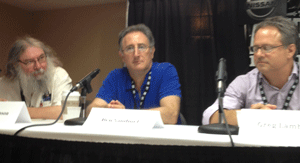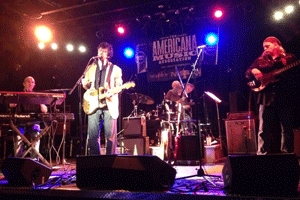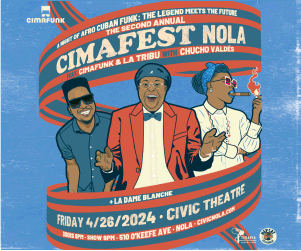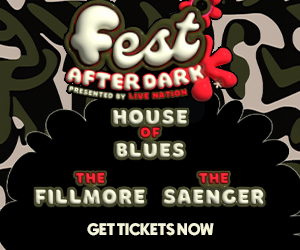So fresh back from the Americana Music Festival in Nashville last week–which focused on New Orleans. Here are a few comments on the experience.
This year, the Americana Music Association (AMA) chose to focus on New Orleans, which meant that there were a couple of panels devoted to New Orleans music (one on the history of the city’s music and one on “new” New Orleans). Plus there was a full house gathered in the Ford Theater of the Country Music Hall of Fame to hear an interview by historian/Tulane prof/American Routes radio host Nick Spitzer with Mac Rebennack/Dr. John.
Rebennack also received a Lifetime Achievement Award in Performance from the AMA at their annual awards event on Wednesday evening. Then there was a showcase of New Orleans music (sponsored by OffBeat) at The Rutledge, a Nashville venue that often presents New Orleans musicians. The showcase included Dash Rip Rock, Susan Cowsill, Tommy Malone and his new band, Jon Cleary & the Philthy Phew (Cleary plus “Jellybean” Alexander and Cornell Williams), and closing out, the Dirty Dozen Brass Band.
Americana music is sort of an amorphous genre that, to me, is more rooted in classic country, rock, singer-songwriter originals, and to a lesser extent, blues. The AMA defines it as “contemporary music that incorporates elements of various American roots music styles, including country, roots-rock, folk, bluegrass, R&B and blues, resulting in a distinctive roots-oriented sound that lives in a world apart [not that far apart] from the pure forms of the genres upon which it may draw. While acoustic instruments are often present and vital, Americana also often uses a full electric band.” Until the AMA gave it a “genre,” we often called it Alt-country, roots-rock or even country rock. Most Americana seems to be pretty much a southern thing, too.
I suppose people in my generation have been “Americana” fans for a long time because I’d consider mainstream performers like pop bands the Eagles, Tom Petty, Little Feat, Linda Ronstadt (in her earlier days), Crosby Stills & Nash, Neil Young, Emmylou Harris and many more to be outside the realm of rock, and not country, either—but we actually called it rock then (what did we know?). So the so-called genre has really existed for a real long time. It just didn’t have a genre name or a Grammy category at the time.
Of course, I couldn’t have been more pleased that the AMA decided to give Dr. John a Lifetime Achievement Award in Performance at its annual awards show. The interview of Mac by Spitzer was fascinating for those who hadn’t experienced his “persona” speak before, and amusing for those of us at the event who have. He referred to many local musicians who probably weren’t too familiar to many unless you were an aficionado of New Orleans music. I particularly relished his comments on Cosimo Matassa, who in the studio (and outside too) could tell more jokes to set one at ease than anyone else on the planet. Mac’s gris-gris-heavy “nitetripper” persona was in actuality created by none other than AFO Records’ founder, composer, saxophonist and arranger Harold Battiste, Jr., a New Orleanian who lived in Los Angeles at the same time Rebennack was living and working there.
The panels were appealing to everyone who loves New Orleans (and who at a roots music conference doesn’t love New Orleans?). The history panel focused on the origins of jazz (did

Panelists John Swenson (OffBeat/author), Ben Sandmel (author and hsitorian) and Greg Lambousy (Louisiana State Museum).
it really have its roots in New Orleans? Is it the country first “music city”?), Congo Square, Mardi Gras Indians and social aid and pleasure club parades, marching bands: the confluence of European, African and Caribbean music and their gumbo that’s what we call “New Orleans sound.”
The “new” New Orleans panel only emphasized that the city produces such a fecund environment for musical creation that its musical traditions and that those traditions are so inherent in our culture that they can’t help but influence anyone who chooses to live in New Orleans and make music—even music that doesn’t on the surface sound like it’s from here.
One thing I took away from the Americana Fest (other than a really good time and a chance to schmooze with a lot of like-minded music folk) is that New Orleans—while it fills the bill as a city whose roots have produced unique musical frameworks—is not primarily a roots-rock town. Roots-rock and Americana music is based instrumentally on guitars; New Orleans is a piano, drum and brass town. The beat is what is totally unique about our music(s). Lyrics, not so much—we live for the beat, and the dance.
It occurred to me that if Americana music is about certain roots music styles–country, roots-rock, folk, bluegrass, R&B and blues—it seems to focus a lot more on the first four genres, rather than the last two. In other words, Americana seems oriented more towards the white music ethos, rather than the influences from African-Americans, or Hispanic Americans. I’m not contending that blues and R&B don’t have a part in what’s considered to be Americana music; it’s just that it’s almost buried so deep within the Americana genre that you almost don’t hear it at all.
As we know at OffBeat, it’s hard to categorize any kind of music, but we’ve always attempted to provide that for our readers because some of them ain’t from ‘round here. A visitor may pick up a copy in a local hotel; we feel it’s our mission to steer as many people to local music venues as possible by making sure they feel comfortable with bands whose music they may not be familiar with.
It’s too bad the Cajun/Zydeco category was eliminated from Grammy consideration, but knowing the state of the music biz, it’s totally obvious that CZ at minimum and a “New Orleans” music genre will never make the Grammy category cut. The AMA has done many musicians a service in being able to categorize and lobby for certain musicians and bands with an Alt-country/roots-rock (or whatever you want to call it) sound to get recognition and attention, and ultimately sell more music to fans. We applaud their efforts and thank the AMA for the attention to New Orleans.
But, an Americana town—as they define it—we are not. We’ve got way too much color in our musical plumage.





